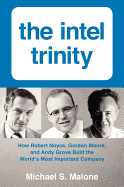Jack Covert Selects - The Intel Trinity
July 11, 2014
Michael S. Malone sets out to give due credit to the three men most responsible for Intel's success—and for Silicon Valley as we know it.
The Intel Trinity: How Robert Noyce, Gordon Moore, and Andy Grove Built the World’s Most Important Company by Michael S. Malone, Harper Business, 560 page, $34.99, Hardcover, July 2014, ISBN 9780062226761
The Mark Zuckerbergs and Steve Jobs of the world have received an enormous share of the past decade’s business and cultural limelight, and with good reason: they, along with a growing number of Silicon Valley tech innovators, have altered how we as individuals exist within a larger cultural context, how we gather and digest information, and how we interact with one another. Often overlooked, though, are the pioneers of the very industry in which these innovators exist, pioneers who built a company on which Facebook, Apple, Google, and every other major tech company still rely. That company is Intel, and in his new book, The Intel Trinity: How Robert Noyce, Gordon Moore, and Andy Grove Built the World’s Most Important Company, veteran Silicon Valley author and journalist Michael S. Malone sets out to give due credit to the company, and in particular the three men most responsible for Intel’s unprecedented success, the innovators that are more responsible than anyone for Silicon Valley as we know it.
The Intel Trinity opens with a brief but critically important set of chapters dedicated to the 10-year period from 1957 to 1967 that began when a group of men dubbed “The Traitorous Eight” left Shockley Transistor to found and grow Fairchild Semiconductor, a company that became the incubator for the talent that splintered off into scores of future Silicon Valley tech start-ups and venture capital institutions. Two of the Traitorous Eight (a name given to them by William Shockley after the Eight left his company) were Robert Noyce and Gordon Moore. Andy Grove would join Noyce and Moore at Fairchild and later become one of the most important businessmen of his generation.
Whereas most tech bios revolve around one central figure, this book drives home that perhaps the world’s most important company doesn’t, and couldn’t, have just one genius leader. Intel’s eventual success relied on three very different personalities complementing one another and compensating for each other’s deficiencies.
Noyce was the beloved and charismatic but often indolent and unreliable Father. Grove was the brilliant but truculent Son in a perpetual Oedipal battle with Noyce, while always protecting Moore, a Son for whom reaching even the highest pinnacles of success and fame was not quite enough. And Moore, the embodiment of kindness and decency, was the very Holy Spirit of the digital age, but also ethereal and unwilling to make the tough choices. It was an unholy Trinity, but also a perfect fit.
Ater providing in-depth backstories for Noyce, Moore, and Grove, stories that inform what each leader brought to Intel and why their individual personalities were crucial, The Intel Trinity weaves through five distinct periods of Intel history: The Start-Up Era, The Microprocessor Wars, The Industry Titan Era, The Global Giant Era and finally, the Post-Founders Era that continues to the present. Through these periods, Malone deftly reveals a company that wasn’t always sure about its own future. Intel had to endure great internal manufacturing struggles while holding at bay external challenges from hungry, smart and driven competition. But when the Trinity successfully transitioned Intel from a memory chip business to a microprocessor company and landed the contract everyone in Silicon Valley wanted—IBM—Intel assured its future as “The Worlds Most Important Company.”
Malone’s book has girth and is filled with a healthy dose of superlative (“the World’s Most Important Company” is in the book’s subtitle, after all), but the 500-plus page count is by no means excessive and the superlatives are warranted. Overall, it’s a brisk and engaging read about the men who almost single-handedly spawned our modern tech industry.



